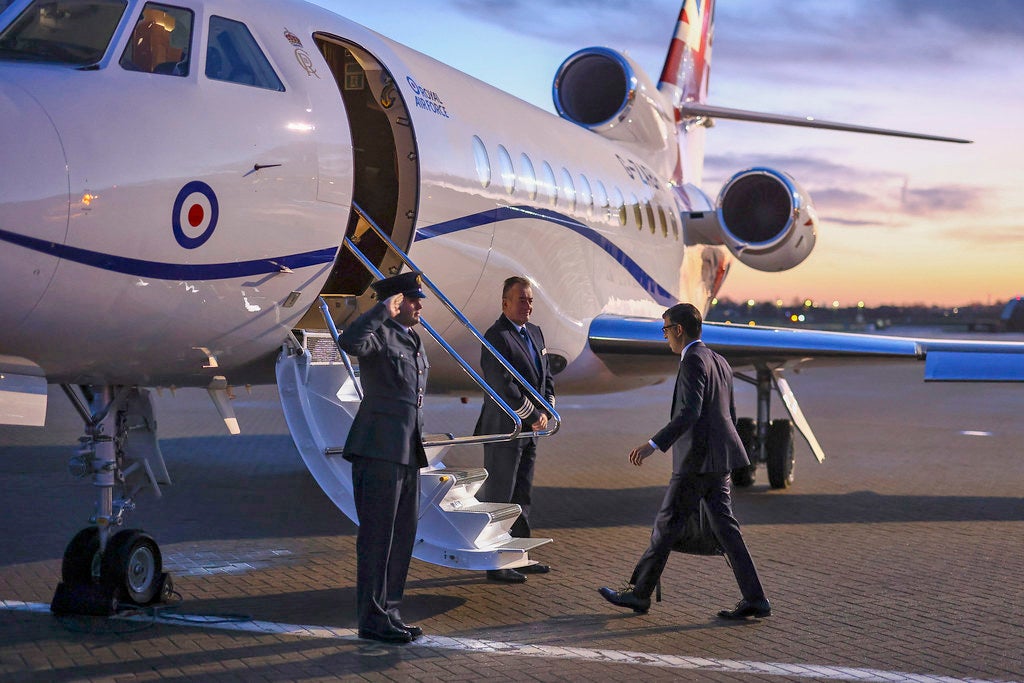How hypocritical is Rishi Sunak’s use of helicopters and private jets?
Labour says the PM may have breached the ministerial code but he faces an even bigger problem in the eyes of voters, says John Rentoul


The prime minister started the week with a bad-tempered interview with BBC Radio Scotland, whose presenter Martin Geissler asked him if he was coming to Aberdeen by private jet.
When Rishi Sunak said, “I’ll be flying as I normally would, that is the most efficient use of my time,” Geissler responded: “It’s ‘do as I say not as I do’, isn’t it?” The implication being that the prime minister, who says “of course net zero is very important to me”, ought to be setting an example by travelling by train – or at the very least by scheduled flight.
Sunak took issue with the implied charge of hypocrisy: “That question brings to life a great debate here. If you or others think that the answer to climate change is getting people to ban everything that they’re doing – to stop people going on holiday – I think that’s absolutely the wrong approach.”
How could the prime minister have travelled?
If Sunak had been in his North Yorkshire constituency, he could have travelled by train, starting at 6.37am, taking five hours with two changes, to arrive in Aberdeen just before midday. Or he could have travelled by scheduled commercial flights, which would have produced fewer global warming emissions per person. Instead, he took an RAF jet there and back to London.
What would a Labour prime minister do?
Emily Thornberry, the shadow attorney general, criticised Sunak’s “addiction to helicopters and private jets” and demanded that he explain how the use of an RAF plane was compatible with the ministerial code. The code says: “Ministers must ensure that they always make efficient and cost-effective travel arrangements.” But it also says that “non-scheduled flights” may be authorised if “security considerations” preclude a scheduled service.
Was Sunak’s journey really necessary?
Some of the prime minister’s critics have suggested that, even if an RAF plane was a reasonable option, he was only going to Aberdeen for a photo opportunity. The Downing Street media operation wanted pictures to put on the No 10 Flickr account to go with Sunak’s announcement of new licences for North Sea oil and gas exploration.
However, he and Alister Jack, the Scotland secretary, did meet executives and other employees of the Shell St Fergus Gas Plant. Even if such visits are mainly for show, that kind of show is part of the prime minister’s job. You can imagine what the Scottish National Party, for example, would say if Sunak never came to Scotland.
Yes, but if he was serious about climate change…
Most people would agree that climate change is the most urgent long-term problem facing humanity, and yet most people still go on holiday by plane. We are all hypocrites, but is Rishi Sunak more hypocritical than most? He has set out policies that aim for net zero global warming emissions by 2050, which some people may say are inadequate, but even the greenest accept that some oil and gas will continue to be burnt in the meantime.
Most people want their leaders to set an example, but it would be hard to satisfy public opinion on the question of travel. Opinion polls suggest that the public is opposed to the prime minister using a private jet even for long-haul flights abroad – although it may be that the phrase “private jet” prompts something like a Pavlovian response.
Equally, a hair-shirt approach doesn’t always yield political dividends. Gordon Brown, for example, initially dispensed with police motorcycle outriders for his car when he became prime minister, hoping to differentiate himself from “President Blair”. But after he arrived very late for a school visit in outer London on one of his early days in office, he reinstated them.
And what about the BBC?
The Mail on Sunday last month quoted Conservative MPs criticising Justin Rowlatt, the BBC’s climate editor, for flying to Spain to report on its heatwave, which as Rowlatt pointed out most scientists say was made more likely by climate change.
A BBC presenter interviewing the BBC’s climate editor might say: “It’s ‘do as I say not as I do’ isn’t it?”
Join our commenting forum
Join thought-provoking conversations, follow other Independent readers and see their replies
Comments